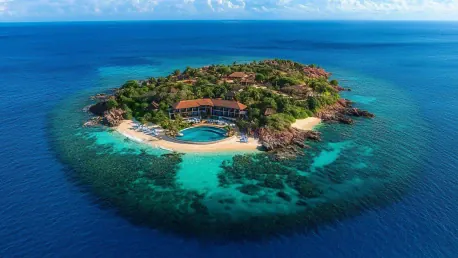In a world increasingly conscious of environmental impacts and sustainable practices, Corona Island stands out as an innovative model for combining eco-friendliness with luxury tourism. The island, located 12 miles off Cartagena, Colombia, was purchased in 2021. Initially designated for “friends and family of the brand,” it has now opened its doors to the public. Tourists can book their stay through popular platforms such as Airbnb, Expedia, and Booking.com. This venture highlights a growing trend where brands are integrating sustainable practices into their core operations and expanding these principles into new domains like eco-tourism.
A Sustainable Sanctuary
Plastic-Free Commitment and Renewable Energy
Corona Island distinguishes itself through its rigorous commitment to sustainability, embodied in its plastic-free environment and eco-friendly infrastructure. The island has been awarded Oceanic Global’s three-star plastic-free Blue Seal for eliminating single-use plastics, making it the first island to achieve this milestone. This certification underscores Corona Island’s dedication to minimizing environmental impact through conscientious practices.
Renewable solar energy powers the island, further reinforcing its commitment to sustainability. The use of solar panels not only reduces the island’s carbon footprint but also ensures a consistent and reliable energy source. Traditional building techniques such as bahareque have been employed in the construction of the island’s structures. In addition to bahareque, the use of native plants like guadua contributes to the island’s ecological harmony. These sustainable practices serve as a testament to Corona’s broader environmental ethos.
Eco-Friendly Accommodations and Experiences
Visitors to Corona Island can enjoy staying in waterfront bungalows equipped with modern amenities like jacuzzis, designed to provide a luxurious yet environmentally friendly experience. The bungalows are constructed with materials that align with the island’s sustainability goals, ensuring that visitors’ stays are both comfortable and conscientious. Local food is a focal point of the island’s dining experience, with an emphasis on sourcing ingredients from the surrounding area, thereby supporting local communities and reducing transportation-related emissions.
The island offers a variety of experiences that connect visitors with nature and promote ecological awareness. Activities such as yoga, paddleboarding, and snorkeling allow guests to engage with the island’s natural beauty. More hands-on experiences include participating in coral reef restoration and mangrove planting projects. These activities not only enhance the visitor experience but also contribute to the island’s ecological sustainability, fostering a deeper appreciation for environmental conservation.
Symbolizing Brand Values
Clarissa Pantoja on Corona’s Environmental Commitment
Clarissa Pantoja, Vice President of Corona, emphasizes that the brand’s venture into eco-tourism with Corona Island is a reflection of its commitment to nature. Corona beer is brewed with 100% natural ingredients, and this focus on natural purity is mirrored in the island’s operations and offerings. According to Pantoja, the island symbolizes Corona’s broader values regarding environmental conservation and sustainability. The creation and operation of Corona Island are extensions of these principles, serving as a tangible manifestation of the brand’s ethos.
This alignment between product values and environmental practices is further illustrated by Corona’s achievement of a net-zero plastic footprint since the island’s purchase, achieved through recovering more plastic than it uses. Such practices reflect the growing importance of Environmental, Social, and Governance (ESG) considerations in business operations. By prioritizing these practices, Corona is setting a standard for integrating sustainability into both its products and its organizational mission.
Broader Environmental Impact and Future Initiatives
While highlighting the innovative blend of sustainability and tourism on Corona Island, it’s crucial to recognize the broader environmental impact of the brand’s initiatives. Since the island’s acquisition, Corona has been committed to reducing its plastic usage, achieving a significant milestone by recovering more plastic than it contributes to the environment. The brand’s shift towards using glass bottles and minimizing plastic to ingredient labels demonstrates its long-term dedication to sustainability.
Looking to the future, Corona plans to continue its focus on eco-friendly practices both on Corona Island and in its broader operations. Initiatives aimed at maintaining a net-zero plastic footprint and expanding the use of sustainable materials are central to these efforts. Pantoja confirms that the iconic lime in Corona bottles will remain a staple, enhancing the brand’s image as a promoter of relaxation and natural enjoyment. By integrating these elements, Corona not only enriches its brand identity but also fosters deeper public engagement with environmental sustainability.
The Path Forward
In a world that’s becoming increasingly aware of environmental impacts and sustainable practices, Corona Island stands out as an innovative model that merges eco-friendliness with luxury tourism. Situated 12 miles off Cartagena, Colombia, the island was purchased in 2021. Originally intended for “friends and family of the brand,” it has now opened its gates to the public. Tourists can book their stay via popular platforms like Airbnb, Expedia, and Booking.com. This initiative underscores a growing trend where brands weave sustainable practices into their primary operations and extend these principles into emerging domains like eco-tourism. By embracing sustainable methods, Corona Island not only promotes environmental consciousness but also offers a luxurious escape that doesn’t compromise on comfort or responsibility. Such ventures highlight the potential for harmonious coexistence between luxury and sustainability, setting a precedent for future tourism projects to follow suit.









